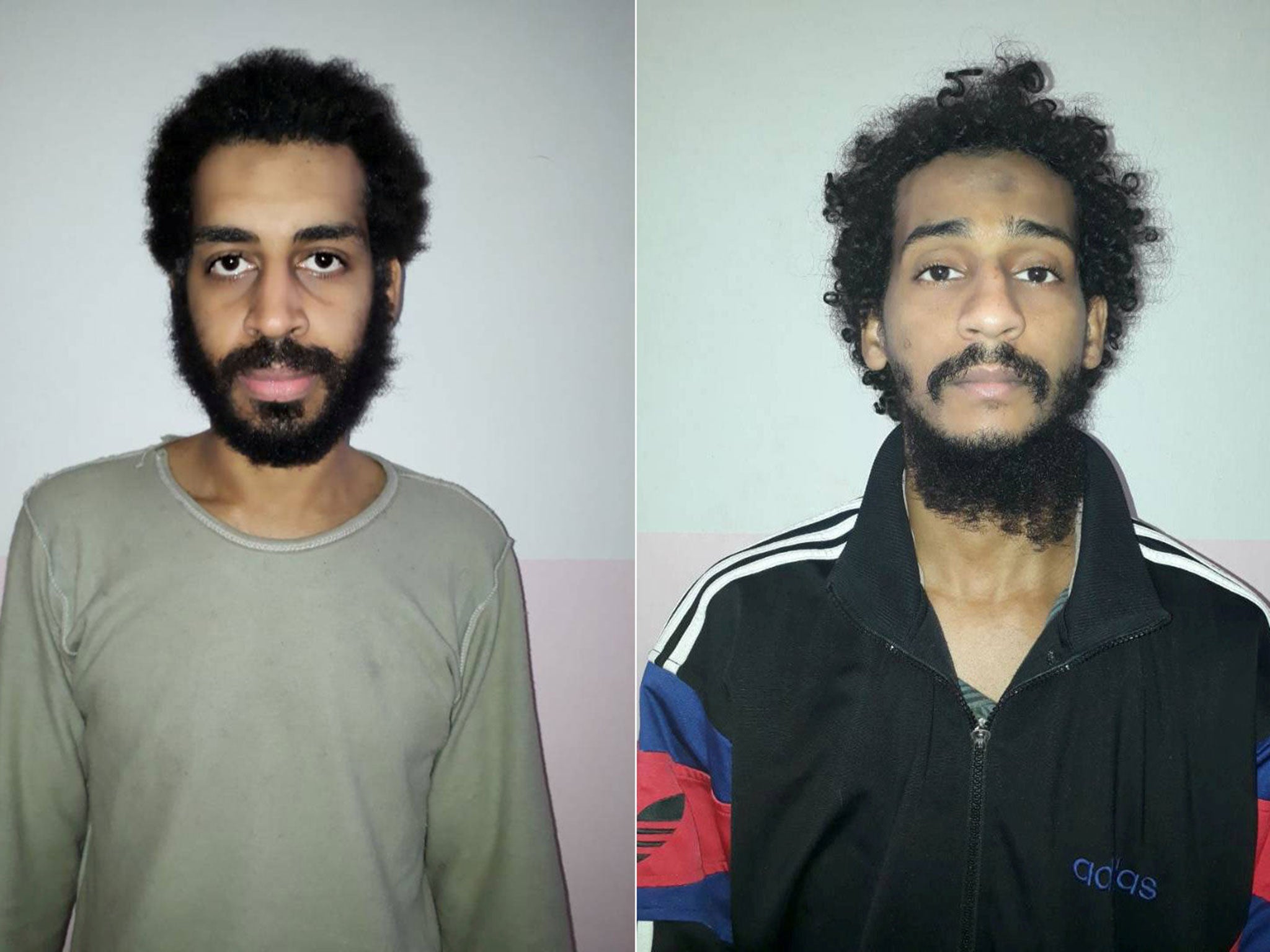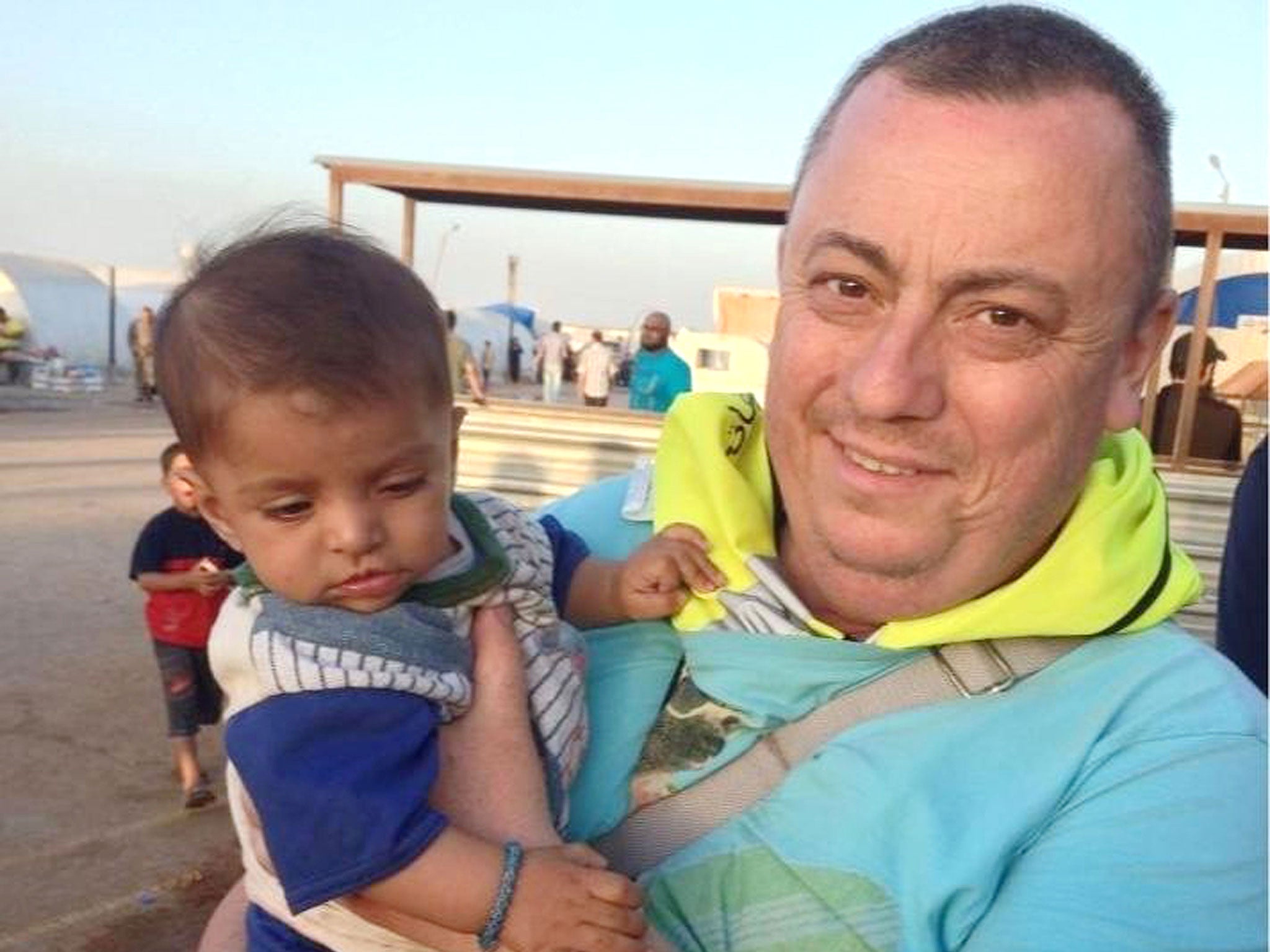UK facing legal action over 'unlawful' decision not to protect Isis 'Beatles' from death penalty
Alexanda Kotey and El Shafee Elsheikh, who were stripped of their British citizenship, could face execution in the US

Legal action could be launched against the government over its failure to demand that two members of a British Isis cell known as “the Beatles” will not be executed in the US.
MPs are in uproar over the fact they were not consulted about the reversal of a long-held policy barring extradition or intelligence sharing in cases where the death penalty may be used.
The Howard League for Penal Reform is now examining the possibility of legal action against the home secretary, Sajid Javid, over the fate of Alexanda Kotey and El Shafee Elsheikh, who were stripped of their British citizenship before they were captured in Syria earlier this year.
The charity’s chief executive Frances Crook said: “We are committed to upholding the rule of law and the total abolition of capital punishment. We have been advised that legal action is feasible. We are consulting with senior legal figures on the precise details and we will make an announcement shortly.”
Ben Emmerson QC, a former United Nations special rapporteur on human rights and counterterrorism, said the decision was “unprincipled, incompetent and almost certainly unlawful”.
He told BBC Radio 4’s Today programme that the British government’s historic position of opposing the death penalty in all circumstances “has translated to an absolute rule, which is legally enforceable, not to extradite an individual to a country where they are at serious risk of the death penalty without an assurance in advance that the penalty will not be carried out”.

Kotey and Elsheikh are currently being held by the Syrian Democratic Forces (SDF), a non-state coalition backed by the US.
This, along with the fact they are no longer British citizens, means the transfer will not technically be an extradition but a “mutual legal assistance” arrangement.
A leaked letter from the home secretary told the US attorney general that the government was not requesting the pair to be transferred to Britain for trial, or seeking assurances that the death penalty would not be used.
“We believe that a successful federal prosecution in the US is more likely to be possible because of differences in your statute book and the restrictions on challenges to the route by which defendants appear in US courts,” Mr Javid wrote.
He also promised to hand over material from a four year investigation by counterterror police to be used in a federal criminal investigation.
Mr Emmerson said the decision could “absolutely” be challenged in court and violated government guidance published by David Cameron in 2010, which “prohibits any cooperation of this kind”.
The lawyer said that although the deprivation of UK nationality means Kotey and Elsheikh cannot assert some of their previous rights, it is “immaterial to the legality of the British government passing information to a foreign power where they know the consequence is going to be a fundamental human rights abuse of this kind”.
Ben Wallace, the security minister, argued in the House of Commons last week that seeking an assurance against the death penalty might “get in the way” of a US trial.
He was jeered for suggesting the alternative was letting Kotey and Elsheikh “roam free”, and used Isis’ horrendous crimes to bat away questions from MPs over why the government had not followed normal policy.
“The crimes that we are talking about include the videoed beheading of dozens of innocent people by one of the most abhorrent organisations walking this earth,” Mr Wallace said.
“We are not going to seek assurances because it is our reality that we do not think we have the evidence here to try them in the UK.
“At the end of the day, this is about the security of our country and about security being delivered where it can be done.”
Downing Street threw its weight behind the Home Office by saying Theresa May supported its handling of the case.
“The ultimate aim for all of us in our discussions with the US is to make sure that these men face the rest of their lives in prison – that is also what the victims’ families want,” said a spokeswoman. “The prime minister was aware of these plans and supports the way that these are being handled.”
Diane Foley, the mother of murdered hostage James Foley, has called for a fair trial – and a captive who survived said he did not want to see Kotey and Elsheikh be given the “satisfaction” of execution.
French journalist Nicolas Henin, who was released by the ‘Beatles’ cell of Isis militants four months before they started a wave of filmed executions, told The Independent that the death penalty would fulfil the pair’s stated wish for martyrdom.
“The basic principle in war is that you will never give your enemy satisfaction,” he added. “If they want to die you should not give them that.”

Tory grandee Ken Clarke was among the Conservatives condemning the government, saying the UK “must not let its standards slip” in the face of terror.
“We should have nothing to do with cases of this kind unless we have assurances that people aren’t subject to the death penalty,” he told The Independent. “The reputation of this country depends on upholding the highest standards of human rights and individual liberty, and things like torture, rendition and the death penalty should not be part of our tough and effective intelligence services.”
Terror experts have cautioned that executing Kotey and Elsheikh would hand Isis a fresh propaganda victory as it seeks to regroup in new “wilayat” (provinces) following territorial losses across Syria and Iraq.
Charlie Winter, a senior research fellow at the International Centre for the Study of Radicalisation and Political Violence, said the death penalty “would be a gift”.
“Killing them would inevitably result in them being framed as heroic martyrs to the Isis cause,” he added.
“The killing of two former fighters from the ‘crusader’ UK by the ‘crusader’ US would be a communication coup for Isis.”
Originally from London, Kotey and Elsheikh were declared “Specially Designated Global Terrorists” by the US State Department ahead of their capture in January, with official documents naming them as members of the “the Beatles” and saying the cell had beheaded more than 27 hostages and tortured many more.
Hostages have told of their brutality, which included torture, waterboarding, electric shocks, mock executions and crucifixions.
Executioner Mohammed Emwazi, who became known as “Jihadi John”, was killed in a drone strike, while the remaining “Beatle” Aine Davis is imprisoned in Turkey.
Join our commenting forum
Join thought-provoking conversations, follow other Independent readers and see their replies
Comments
Bookmark popover
Removed from bookmarks